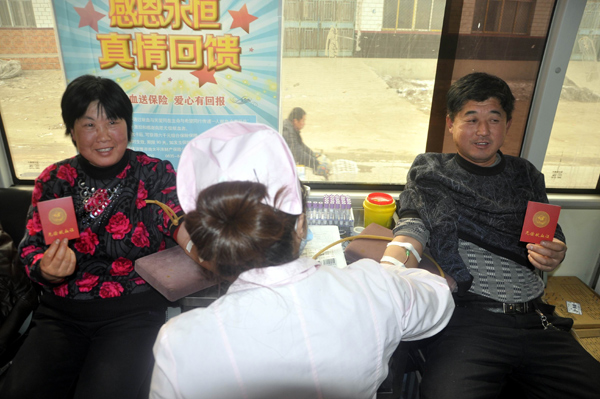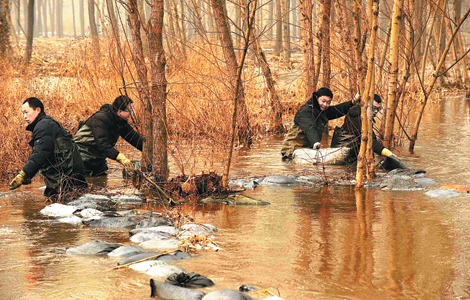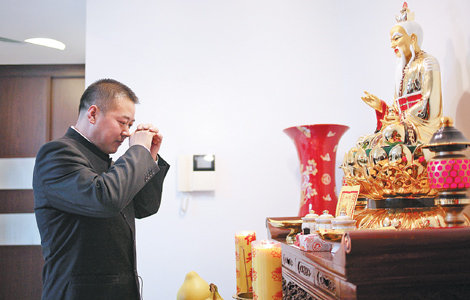Probe begins into illegal blood trade
Updated: 2013-01-11 01:18
By Wang Qingyun (China Daily)
|
||||||||
An investigation into the sale of fake blood-donation certificates is under way after a newspaper reported it had uncovered an illegal trade exploiting the blood donation system.
New Express Daily in Guangzhou, Guangdong province, reported last week that one of its reporters bought a proof of blood donation certificate for 3,000 yuan ($480) without making the donation.
 |
|
Farmer Liu Guixi (left) and her husband, Zhu Lianshui, donate their blood in a collection vehicle in Dongma village, Liaocheng, Shandong province, on Monday. Each of them held a certificate proving they are voluntary blood donators. [Photo/China Daily] |
Deng Haihua, spokesman of the Ministry of Health, said at a news conference on Thursday that the local health department is still verifying the incident and police have opened an investigation into the illegal practice.
China has policies encouraging blood donation by promising free blood transfusions for the donors or their family members.
Blood donors are given a certificate of proof each time they donate.
In Guangzhou, a regulation adopted in 2004 stipulates that people who donate 200 milliliters of blood or more in the city will receive blood transfusions for free if they ever need them.
Those who donate 600 milliliters of blood can also get free blood transfusions for their parents, children or spouse.
People have to pay for transfusions if they have not donated blood previously and have no close relatives who did. They also must pay "fees of mutual help", which are three times the cost a hospital pays for the blood.
But the "fees of mutual help" can be refunded if the person who received the blood transfusion or their relatives donate blood within six months of the transfusion.
The policy was expected to encourage blood donations.
But it was discovered that many parents of children who need regular blood transfusions, because of diseases such as Mediterranean anemia, have bought or tried to buy certificates of proof of blood donation, so that they can be reimbursed the transfusion fees.
According to New Express Daily, there are "brokers" who sell quality copies of these certificates which include information such as the supposed donor's name, blood type and ID number.
Some people have used the forged certificates to receive reimbursements for transfusions despite never donating blood, the report said.
Fu Yongshui, director of Guangzhou Blood Center, confirmed to New Express Daily on Saturday that a staff member at a local blood collection station issued a fraudulent certificate, but the staff member denied being involved in forging certificates.
Fu said one possible way the certificate was produced, was that someone used a fake driving license with the buyer's information to pass the blood collection station's identity check and donate blood.
Fu told China Daily on Thursday the police investigation is under way and there is no new information yet.
Spokesman Deng said "mutually beneficial donation" is a way to collect blood when there is a shortage.
"The Ministry of Health will combat the illegal trade of blood together with other departments," Deng said.
Illegal trade involving mutually beneficial blood donation is not new.
In March 2012, the Haidian district court in Beijing sentenced five brokers to several years in prison.
The brokers took advantage of blood shortages.
Patients who needed urgent blood transfusions were told their family members had to donate an equal amount of blood before they could receive their transfusion. The brokers organized people to donate blood pretending to be the patient's family member or friends, and charged the patient afterwards.
"We should push forward with voluntary blood donation. Only an adequate supply of blood can lower the occurrence of mutually beneficial donations, and the risk of the illegal blood trade, and in turn guarantee the safety of blood products," Deng said, calling for more people to join the national donation drive.
Contact the writer at wangqingyun@chinadaily.com.cn











